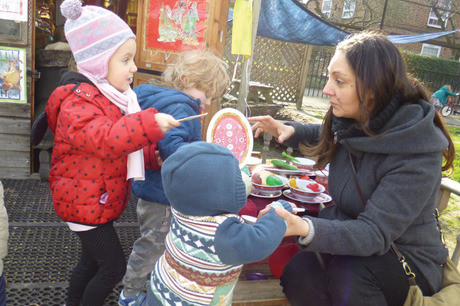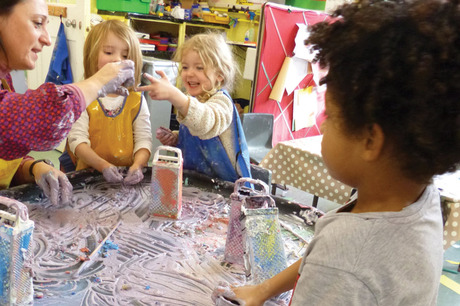
Visit Chelwood Nursery School in Brockley, south-east London, and you’re likely to be confidently shown around by one of the children, who will explain what’s going on and tell you what’s important to them and why. They will probably proudly show you all the places they can play – from the great garden to the classrooms, corridors and even the head’s office.
‘Everything we do is focused on the children, and having a close connection with them is important, so they will even play alongside the head while she’s typing,’ says deputy head teacher Amanda Furtado.
The school, which was designated a National Teaching School (NTS) in 2014 (see box), states: ‘Chelwood focuses on developing confident and independent children who are able to make informed choices and decisions for themselves, while developing a caring and considerate and responsible attitude towards other people and their environment.’
This starts by fostering close links with families pre-admission and continues by using ‘children’s voice’ work – sometimes known as ‘child voice’ or ‘pupil voice’ – to listen to children’s views and involve them in decision-making within the setting. Children are helped to develop empathy and appreciate that others may have differing opinions and preferences.
‘We aim for the children to move on to primary school as independent and autonomous people who have good self-esteem and see learning at any level as something to be celebrated,’ says Ms Furtado. ‘School readiness is about building important skills that will support them throughout life.’
The Outstanding nursery school has 135 children on the roll, with 84 part-time and 48 full-time children across three classes each day. It is situated in the middle of a large housing estate with a mixed demographic of children coming from temporary housing and high-rise flats and more affluent Victorian terraced properties.
FAMILY LINKS
‘The school has a strong ethos of nurturing children by nurturing the whole family. We do a lot of support work with families before the child starts at the setting so that we can find out about what makes them tick – how they learn and their background,’ says Ms Furtado. ‘Developing strong links with the families is irreplaceable because they know so much and it is really important for building children’s confidence and independence. If children feel that they matter then they will learn well and feel good about what they do.’
Staff begin to work with families as soon as places are allocated, starting with a home visit and inviting them to attend weekly ‘Come and Discover’ sessions. The importance of the sessions in supporting settling-in is explained to parents and take-up is high.
The sessions enable families to become familiar with the setting, and start to build a relationship with the staff and other families, with many parents commenting that attending helps to build their child’s confidence.
Information gathered from the sessions is used to allocate a ‘key person’ with whom they have ‘gelled’, allocate children to classrooms and start tailoring a personalised curriculum. ‘Planning is done around individual children so that exciting, motivating and challenging learning experiences can be offered which appeal to them from the beginning, helping to remove potential barriers to learning,’ adds Ms Furtado.
Photos of the children and their families taken during home visits are put up in the classroom ready for their first day as a visible display that their family matters and it is important to work together. ‘It’s a simple but effective way of making the children feel welcome and included,’ explains Ms Furtado. ‘It is all about the children feeling confident and strengthening relationships, which is at the heart of feeling secure.’
Regular ‘Stay-and-Play’ sessions for families continue once the children are settled. One parent commented, ‘It’s lovely to see how confident and relaxed the children are. You get an insight into their experience.’
CHILDREN’S VOICE WORK
‘Children’s voice work feeds in to everything that we do. Staff are skilled to tune in to children and ask open-ended questions,’ says Ms Furtado. ‘We harness what the children think, feel and tell us, where and how they play. It is important for children to know that their voice will be listened to and heard.’
The current cohort of children is even involved in planning the ‘Come and Discover’ sessions as part of the transition work to prepare them for moving to primary school. Staff talk to them about how they felt when they started nursery and how they think the new children will feel. They discuss the experiences that they have enjoyed at nursery, what they have learnt and how they have developed.
‘The sessions support everyone because the current children think about how they would like to welcome the new children into the nursery and also talk about their own next step to school,’ she says.
‘We canvass the children’s opinions. Recently they have played a significant role in developing our outdoor area by discussing how we should spend money, what they like and don’t like and what is important to them. They are supported to be decision-makers and know that their voice matters.’
Through this children’s voice work, staff found they placed a lot of importance on having places to go where they feel hidden. Camouflage netting and voile has been used to create areas that feel private to the children but where they can still be observed. ‘Children voted on a den for outside and they deliberately chose one with a door too small for an adult. They want places where they can be independent and feel grown up.’
Children are helped to learn to respect others’ points of view. ‘We encourage empathy by actively talking to the children, such as that child does not want to play in a big group because it is too noisy for them. We unpick it to help give them tolerance and respect,’ says Ms Furtado.
‘Children leave feeling proud of themselves and that’s what is important – children going to primary school feeling confident in what they do, that it is OK to make mistakes as long as they persevere. That’s the best start that we can give them.’
IN THEIR WORDS…
‘We learn tricky things and we make mistakes but we just start all over again. Your friends help you when you are stuck.’
‘You can play with lots of people and we can make up our own minds about what we want to do.’
‘We do lots of great making stuff. We don’t need help to do much ’cos we just do it ourselves.’
‘Leaving Chelwood is like growing out of your favourite party dress.’
THEN AND NOW
Chelwood has a strong history of working with local families to raise strong, independent learners. It opened as Honor Oak Nursery School in 1939 to provide nursery education for the children living in the neighbouring new tenement blocks.
It was built as an ‘open-air’ nursery with wide fold-back windows opening on to a large outside play area. The school, renamed after the war, retains the open-air philosophy with a free-flow curriculum and children playing outside in all weather.
Chelwood was designated a National Teaching School in 2014 and is committed to supporting the development of high-quality early years provision across the state, private and voluntary sectors. ‘Becoming an NTS has helped us to be more sustainable. It enables us to share our expertise but also develop our own practice and continuing professional development. It’s been good at helping the whole school community to develop our learning on a shared learning journey,’ says deputy head teacher Amanda Furtado.
Chelwood works in alliance with South Thames Early Education Partnership (STEEP) Nursery Schools – a partnership of six like-minded nursery schools and children’s centres across Lewisham and Greenwich, with the Education Teaching Alliance Lewisham, and other settings across London and the south of England.
Staff work with childminders and are currently, with Lewisham Local Authority, exploring the potential for supporting vulnerable two-year-olds through high quality childminding provision.
MORE INFORMATION
Chelwood Nursery School, www.chelwood.lewisham.sch.uk
About STEEP, www.chelwood.lewisham.sch.uk/wp-content/uploads/2014/09/About-STEEP.pdf
How to get involved in the NTS programme, www.gov.uk/government/collections/teaching-schools-and-system-leadership-how-you-can-get-involved









